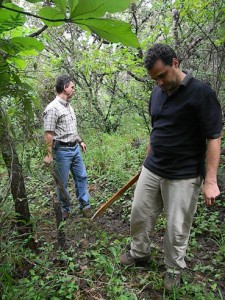EARTH’s Carbon Neutral Unit expands beyond campus
Last month, EARTH University’s Carbon Neutral Unit almost ceased to exist.
On their way to a workshop in the northeast province of Guanacaste, Costa Rica, a 12-meter trailer filled with pineapples hit the vehicle on a curve around the infamous San Miguel region, an area known for many deadly accidents. Fortunately, no one was hurt but the vehicle was destroyed.
“Not a lot of people know what we do,” explains Dr. Edmundo Castro, the director of the Carbon Neutral Unit. “The work that our unit does is very important.”
The Unit, made up of its director, Dr. Castro and Mili Campos, who is responsible of quality assurance, are the only two full-time members. The Unit receives assistance from EARTH faculty and staff members such as forester Marlon Marín, EARTH agro-forestry professor Ricardo Russo, and Karla Mena, Alumni coordinator.
EARTH’s Carbon Neutral Unit is one of the few entities in Costa Rica that educates and ultimately certifies companies, organizations and even sporting events as carbon neutral, a highly sought distinction especially after Costa Rica announced its commitment to become the first carbon neutral country in the world by the year 2021. “For Costa Rica to become the world’s first carbon neutral country would be a very significant example to the world,” said Dr. Castro, who is also an agricultural and environmental economics professor at EARTH. “If we can do it, then other countries can follow.”
Balancing carbon emissions can be done through reduction emission activities and subsequently tree planting and the conservation of forests. An example of that took place a few weeks ago, at the World Rafting Championship in Turrialba, near our University. There, EARTH’s Carbon Neutral Unit certified the event as the world’s first carbon neutral international sporting event.
Making this competition carbon neutral, where 48 teams from 36 different countries participated, took a great deal of ingenuity and cooperation, including the participation of the athletes.
Competitors pledged to reduce their carbon emissions by agreeing to sleep in a tent camp with roughly 600 participants and staff members.
“By these teams staying here, and not in hotels around the Limón, Turrialba or Guápiles areas, they are reducing emissions,” explained Dr. Castro. “Also, solar panels were set up along the campsite to reduce the use of electricity generated by conventional means.”
To offset the carbon emissions from the Rafting competition, 2.5 hectares of local tree species, donated by EARTH University, were planted during the sporting event by all of the participating athletes.
Rafael Gallo, president of the International Rafting Federation and the organizer of the World Rafting Championship in Costa Rica, said he had some prior knowledge of the carbon neutral methodology since his rafting company Rios Tropicales is in the process of getting certified.
“We had a lot of challenges with waste management and we had done reforestation projects with EARTH University in the past,” Mr. Gallo said, whose rafting company is based in Turrialba.
“The prestige that EARTH University holds regarding carbon neutrality is highly important. Currently in this country, I don’t think there are any carbon neutral certifiers with the same credibility as EARTH.”
A few weeks ago, the Unit provided a one-day workshop at the University’s EARTH-La Flor campus in Guanacaste to 25 participants from 13 different organizations and companies in Costa Rica.
The workshops offered by the Unit serve as a first step for certification by offering information on carbon neutrality and explaining the benefits for their organization and the surrounding communities.
“They cannot get certified if they do not know how to start the process,” Dr. Castro explained. “We present the outline of what exactly they need to do to get the process started.”
Manuel Guerrero, a coordinator at FUNDECOR, a non-profit that focuses on the protection of forests and reforestation along the central valley mountain range, attended the workshop and said that these types of classes are not only interesting, but very important to the country’s push for carbon neutrality in the next ten years.
“The information given here today is very practical,” Guerrero said. “Getting certified is not only something feasible for us but necessary. Our organization cannot be left behind in regards to environmental issues and the management of natural resources.”
In addition to certifying in Costa Rica, EARTH’s Carbon Neutral Unit has granted certifications in Ecuador in collaboration with SAMBITO, an environmental consulting firm owned by EARTH alumni in that country.
“That’s what don Edmundo wants in Costa Rica,” explained Mili Campos, who is also the administrative assistant in the Carbon Neutral Unit here at EARTH. “Don Edmundo wants EARTH students to learn with us about the certification process, not only how our Unit is doing it, but also how an accrediting entity (in Costa Rica) such as ECA, is doing it, and learn about the international regulations so they can become experts in this area.”
With this knowledge, EARTH alumni will be able provide the technical support to companies, organizations and governmental agencies so that they can implement the measures necessary to become carbon neutral.
“There’s enough work for everyone,” Ms. Campos said.





